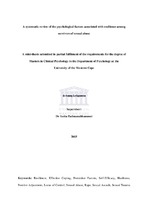A systematic review of the psychological factors associated with resilience among survivors of sexual abuse
Abstract
This study aimed to synthesise the debates on factors associated with promoting resilience among women survivors of sexual abuse. Using systematic review methodology, six electronic databases (EBSCO, PsychINFO, SAGE, Science Direct, Springerlink and JSTOR) were used. Several keywords related to resilience and sexual abuse were utilised to search for articles published between January 2000 and December 2013 for inclusion. These primary studies were collocated, systematically assessed, synthesised and interpreted. Using two reviewers, data extraction was conducted in three stages, namely: the title reading, the abstract reading and the full text reading of articles. For the quality assessment, four instruments were employed, two of which were self-constructed tools. Thirty articles acquired an acceptable threshold score during the analysis and were used to compose this systematic review. Findings of this review highlighted that resilience is multidimensional; that is, it is made up of intrinsic and extrinsic resources/factors and is also a complex gradual dynamic process with specific indicators. These indicators include demonstration of competence and excellent functioning in important areas of life such as work, relationships, self-management, psychological well-being, and good health. Ten interacting factors were identified as promoting resilience including, 1) availability of social support from family and friends; 2) ego resources; 3) temperament/personality factors; 4) biographic characteristics; 5) ability to regulate emotions; 6) cultural factors; 7) positive life opportunities; 8) religion and spirituality; 9) abuse related factors; and 10) coping skills/strategies. These factors interact together, leading the survivor to be resilient. Major findings of the study as well as the implications for practice and further research are discussed.

